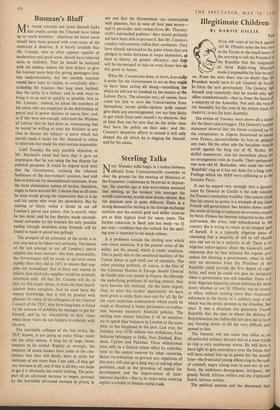Busman's Bluff
MR. FRANK COUSINS can count himself lucky that events across the Channel have taken up so much attention : otherwise his latest move would have been greeted with even more of the contempt it deserves. It is barely credible that Mr. Cousins, who so often appears capable of moderation and good sense, should have behaved quite so foolishly. That he should be annoyed with the railway unions for their failure to give his busmen more help (by giving pasSengers less) was understandable; but the sensible reaction would have been to realise, as everybody else— including the busmen—has long since realised, that the strike is a failure; and to seek ways to bring it to an end as quickly as possible. Not so Mr. Cousins : instead, he asked the members of his union who are employed in the distribution of petrol and in power stations to rescue him; and, as if this were not enough, informed the Minister of Labour that he had done so, announcing that he would be willing to meet the Minister at any time to discuss the subject—a move which not merely made it easier for Mr. Macleod to refuse to intervene but made his intervention impossible.
Until Tuesday the only possible objection to Mr. Macleod's stand had been that it gave an impression that he was using the bus dispute for political purposes. It could be argued (and was) that the Government, realising the inherent feebleness of the bus-workers' position, had told him to hold out for unconditional surrender. Even the most elementary notion of tactics, therefore, ought to have warned Mr. Cousins that at all costs he must avoid giving the impression that it is he and his union who want the showdown. But by making so thinly veiled a threat to cut off London's petrol and power, that is exactly what he has done; and he has thereby made uncondi- tional surrender by the busmen the only possible ending (though doubtless some formula will be found to make it sound less galling).
The prospect of an extension of the strike is in any case not to be taken very seriously. The lesson of the last attempt to cut off London's petrol supplies has been learned : this time, presumably, the Government will be ready to act even more rapidly than they did in 1953 to ensure that sup- plies are maintained. Nor is there any reason to believe that electricity supplies would be seriously interfered with. All that Mr. Cousins will do, in fact, by this empty threat, is make his final humil- ialation more complete. And he must have the uneasy knowledge that it will be greeted with pleasure by many of his colleagues of the General Council of the TUC, who have long been irritated by the amount of publicity he manages to get for himself, and by his insensitivity to their views when those views do not happen to coincide with his own.
The inevitable collapse of the bus strike, the TUC knows, is not going to make things easier for the other unions. A long list of wage claims remains to be settled. Rightly or wrongly, the majority of union leaders have come to the con- clusion that they will finally have to settle for increases of not more than 3 per cent., if they get any increase at all; and if that is all they can hope to get it is obviously not worth striking. The pros- pect of an all-round increase in wages, pursued by the inevitable all-round increase in prices, is not one that the Government can contemplate with pleasure, but in view of their past errors— and in particular their retreat from Mr. Thorney- croft's entrenched position—they would probably not have been able to prevent it. But Mr. Cousins's conduct will certainly stiffen their resolution. They have already advanced to the point where they are pledged to make increases in wages dependent, at least in theory, on greater efficiency; and the, will be encouraged to take an even firmer line an this point in future.
What Mr. Cousins has done, in short, is to malce it easier for the Government to act as they ought to have been acting all along—something for which he will not be thanked by the leaders of the Labour Party. The stimulus may, of course, have come too late to save the Conservatives from themselves; recent public-opinion polls cannot give them any, encouragement, nor are they likely to get much from next month's by-elections. But at least they can be sure that on the strike issue they have the public on their side: and Mr. Cousins's desperate efforts to extend it will only deepen the pit which he is digging for himself, and for his union.












































 Previous page
Previous page